Sermon: Paul’s Last Love Letter to the Church
Ephesians 6:10-20 (Year B, Proper 16)

A month and a half ago we began a journey through the book of Ephesians in our New Testament readings. Unfortunately, Ephesians has been overshadowed by our study of David flowing into Jesus’ discourse on the bread of life. And this is not OK with me because Ephesians is one of my favorite books in the Bible. Has been ever since I can remember.
The book of Ephesians is Paul’s last love letter to the church. Paul is in prison in Rome. Soon, he will be presenting his case to the Roman Emperor, Nero. Nero was the Caesar who dowsed early believers in wax and oil and set them on fire to light his garden parties at night. Nero was the Caesar who laughed and cheered as early believers were driven into the Colosseum to be torn apart by lions. Paul knew his fate. Paul knew what Nero’s verdict would be. One of his last acts was to write this letter of his vision and dream of what the church of Christ is and could be.
Over the last month and a half we have heard portions of Paul’s last love letter to the churches he worked so hard for. These also happen to be some of my favorite passages in the Bible.
I pray that the God of our Lord Jesus Christ, the Father of glory, may give you [all] a spirit of wisdom and revelation as you [all] come to know him, so that, with the eyes of your hearts enlightened, you [all] may know what is the hope to which he has called you (Ephesians 1:17-18).
[Jesus] came and proclaimed peace to you [all] who were far off [Gentiles] and peace to those who were near [Jews], for through him both of us have access in one Spirit to the Father. So then, you [all] are no longer strangers and aliens, but you [all] are fellow citizens with the saints and also members of the household of God, built upon the foundation of the apostles and prophets, with Christ Jesus himself as the cornerstone (2:17-20).
I pray that, according to the riches of his glory, he may grant that you [all] may be strengthened in your inner being with power through his Spirit and that Christ may dwell in your hearts through faith, as you [all] are being rooted and grounded in love. I pray that you [all] may have the power to comprehend, with all the saints, what is the breadth and length and height and depth and to know the love of Christ that surpasses knowledge, so that you [all] may be filled with all the fullness of God (3:16-19).
[Jesus] himself granted that some are apostles, prophets, evangelists, pastors and teachers to equip the saints for the work of ministry, for building up the body of Christ, until all of us come to the unity of the faith and of the knowledge of the Son of God, to maturity, to the measure of the full stature of Christ. We must no longer be children, tossed to and fro and blown about by every wind of doctrine by people’s trickery, by their craftiness in deceitful scheming; but speaking the truth in love, we must grow up in every way into him who is the head, into Christ (4:11-15).
Be careful, then, how you live, not as unwise people but as wise, making the most of the time, because the days are evil. So do not be foolish, but understand what the will of the Lord is (5:15-17).
Paul’s Dream
This is Paul’s dream for the church, for the Body of Christ, everywhere! This is what Paul wants to see happen! He wants the church to know the deep and expansive love of God. If the love of Christ can reconcile even Jews and Gentiles, and make enemies into family in the household of God, what more can happen in the world when that love and reconciliation are the rule and not the exception? Learning to love our enemies and be reconciled to them by the love of Christ is supposed to be normal—not the exception. In Paul’s eyes, THIS is what it means to be part of the body of Christ.
So we’ve done the hard work of loving our enemies and being reconciled with them. You think that would be good enough, wouldn’t you? Not for Paul. Oh no, his dream for the church is just starting. Now we head into my favorite part of Ephesians: the part where Paul tells the church to stop being whiny teenagers and grow up already. One of the reasons I left the Evangelical Movement 16 years ago is that I was never allowed to grow up. I was 38 years old and an ordained minister, and that still wasn’t good enough. One day, I was done with being seen as a perpetual child, and I left.
The reason I was so frustrated is because I knew what Paul told the church in Ephesians 4: Jesus granted different gifts to build “up the body of Christ, until all of us come to the unity of the faith and of the knowledge of the Son of God, to maturity, to the measure of the full stature of Christ.” These gifts are given to the church for one reason and one reason only: to build up the body of Christ and help us grow up, so we can be the hands and feet of Christ in our world. We also have to grow up, so we can be wise and discern the will of God.
Now we come to this morning’s passage in Ephesians:
Finally, be strong in the Lord and in the strength of his power. Put on the whole armor of God, so that you [all] may be able to stand against the wiles of the devil. For our struggle is not against enemies of blood and flesh, but against the rulers, against the authorities, against the cosmic powers of this present darkness, against the spiritual forces of evil in the heavenly places. Therefore take up the whole armor of God, so that you [all] may be able to withstand on that evil day, and having done everything, to stand firm. Stand therefore, and fasten the belt of truth around your waist, and put on the breastplate of righteousness. As shoes for your feet put on whatever will make you [all] ready to proclaim the gospel of peace. With all of these, take the shield of faith, with which you [all] will be able to quench all the flaming arrows of the evil one. Take the helmet of salvation, and the sword of the Spirit, which is the word of God.
Pray in the Spirit at all times in every prayer and supplication. To that end keep alert and always persevere in supplication for all the saints. Pray also for me, so that when I speak, a message may be given to me to make known with boldness the mystery of the gospel, for which I am an ambassador in chains. Pray that I may declare it boldly, as I must speak (6:10-20).
Standing Firm
Now that we, as the body of Christ, know the expansive love of God, now that we’ve done the hard work of loving our enemies and being reconciled with them. Now that we have used our gifts to grow up into the full maturity of Christ, and we are wise people who can discern the will of God, now we can put on the full armor of God to stand against all the forces in this world that tell us we are wrong.
Back in chapter 5, Paul told the church to be wise because the days are evil, and here in chapter 6 he describes the forces arrayed against the church. Forces that didn’t want to hear about God’s love, forces that did not want to love their enemies and be reconciled to them. Forces that wanted to be right and win more than they wanted to hear the truth of God’s love, mercy, and forgiveness. Sound familiar? “This present darkness” and “the spiritual forces of evil” haven’t changed over the millenia. The idols of greed, power, and war have been with us since the early chapters of Genesis. We saw those same idols continue through the reigns of Saul and David. Those forces condemned Jesus to death, and were actively working against the early church at the close of Paul’s life. Those same forces will kill Paul as well.
Paul never minced words. As a Pharisee, he was well-versed in both Jewish history and scripture. He also never forgot how he had persecuted the first Jewish followers of Jesus before God set him straight. He knew the power of these evil forces through history that were alive and well then and now, and he tells his beloved family what they have to do to stand firm and hold their ground.
His words come down to us today, so we too can stand firm and hold our ground against the forces of greed, power, war, and all of the ways we find to diminish and demean each other. The first thing is to remember the truth: every human being on this planet is made in the image of God, God loves every, single person, and God is actively working throughout the whole world to reconcile every, single one of us to God’s self. God has no favorites. So when the powers of “this present darkness” try to divide us up and set us at each other’s throats, we stand firm proclaiming the truth: God has no favorites, and we will not vilify people who don’t look like us, who don’t speak like us, or who don’t believe the same things we do. They are God’s beloved children too, and that is how we are going to treat them.
Then we are told to put on the breastplate of righteousness. The Greek word dikalosynē, can also be translated as justice. If everyone is equally loved by God, then we need to work to make that a reality for all of the people in our lives. This is why the early church in Acts held all things in common, so no one did without. In God’s kingdom, everyone has a place to lay their head at night, everyone eats, and no one is looked down. Everyone has an equal opportunity to find work and to be paid fairly for that work. Jesus’ brother James had some serious words for bosses who didn’t pay a fair wage in the letter he wrote to the early church. Righteousness and justice means we believe that God’s creation provides more than enough for everyone. There is no hoarding. There is no greed. God has provided for all of us, and it’s up to us to make sure God’s bounty is distributed to everyone who needs it.
Next we have to start pushing back against all of the lies we hear day in and day out on our TVs, on our radios, on social media. Paul tells us to put on for shoes “whatever will make you [all] ready to proclaim the gospel of peace.” Peace—everyone says they want it, but very few people, politicians, and countries are willing to do the work and give up the power necessary to make it happen.
I’m sure all of us are thinking about the war in Ukraine and Israel’s bombardment of Gaza. I have no answers on how we proclaim the gospel of peace in the face of these wars. But that is why every you in this letter is plural in the Greek. That’s why when I spoke those passages, I added all to you: you all. We, as part of the body of Christ, are going to have to discern how we can proclaim the gospel of peace to our war-torn and strife-ridden world. This is why Paul told us we had to love and reconcile with our enemies and grow up into the full maturity of Christ. This is why we have to be wise before we can put on the armor of God because this is not a calling for the immature and unwise who will do more damage than good.
According to Paul it is up to the church to preach the gospel of peace to the world, which means there must be a way for the church to proclaim peace and build sturctures of peace for Ukraine and Gaza. I believe there is a role the church must play to proclaim and bring peace to our world because of these verses. Paul believed the church could stand and hold our ground against these evil forces in the world and make our world a better to place to live, and so do I.
We Are In This Together
When I read about the flaming arrows that our shield of faith extinguishes my brain immediately goes to all the hate-filled things our society loves to spew. Words can be used as weapons, and it seems the U. S. is keen on perfecting this kind of warfare against our own neighbors and family members. In order to protect ourselves from all of this hate, we have to know what we believe. We have to know who we are in God and who we are as the church.
At no other time in my life have I had to remind myself so often that I am God’s beloved daughter. I hear so many voices telling me I made the wrong choices, I’m not living the right way, I’m not enough. I am so thankful for all the people God has put in my life who have helped me remember who I am and how God sees me. I am so glad to be part of a faith that believes we are all in this together, and that I don’t have to fight alone. When my faith falters, there are people sitting in this sanctuary who will say “I got you” and help shore up my faith until I can once again believe I am dearly loved daughter of God.
This is why its so important for us to get together here on Sunday and through the course of our week. It’s so important for us to pray together, study the Bible together, eat together, have fun together, and have people we can call at 2:00 in the morning to talk us down. It takes all of us to carry the shield of faith to protect us from all the lies our world and society continually throw at us.
This is also why it’s so important to know the word of God. The last piece of armor is the sword of the Spirit which is the word of God. It is in reading and studying the Bible empowered by the Spirit that we can ground ourselves in God’s truth and reality, so we can hold our ground against all the lies and illusions these evil days throw at us. This is why we have Sunday School and Bible Studies. And does everyone here know how lucky we are to have Father Clay and his knowledge of the Bible? Do you know how lucky we are that our main preacher is so good at making the Scripture we hear proclaimed every week applicable to everyday lives in words we can understand? Pray for him and do not take him forgranted.
We also need ways of reading the Bible on our own. I’d be lost without the Book of Common Prayer and the daily lectionary. But there are many other ways of building Bible reading and prayer into your life. The important thing is it works for you, brings you into a closer relationship with God, and helps you stand firm against this present darkness. We are also expanding Adult Sunday School to two classes, so if you need help with building a habit of prayer and Bible reading into your life, that would be a good place to start.
Paul ends by telling the church to pray. Prayer is our lifeline to God. Prayer isn’t just about us talking to God and sharing our concerns. It’s also about building into time to listen to God. To be able to hear God’s voice and feel where the Spirit is leading us. Everything else we do will be in vain, if we aren’t having deep, intimate conversations with God throughout our day.
I know we have covered A LOT OF GROUND this morning, and thank you so much for sticking with me. And I would like to close with Paul’s prayer for the church, which includes us:
For this reason I bow my knees before the Father and Mother of all, from whom every family in heaven and on earth takes its name. I pray that, according to the riches of God’s glory, God may grant that all of us may be strengthened in our inner being with power through God’s Spirit, and that Christ may dwell in our hearts through faith, as we are being rooted and grounded in love. I pray that we may have the power to comprehend, with all the saints, what is the breadth and length and height and depth, and to know the love of Christ that surpasses knowledge, so that we may be filled with all the fullness of God.
Now to the one who by the power at work within us is able to accomplish abundantly far more than all we can ask or imagine, to God be glory in the church and in Christ Jesus to all generations, for ever and ever. Amen.
All Scripture is from the New Revised Standard Version.
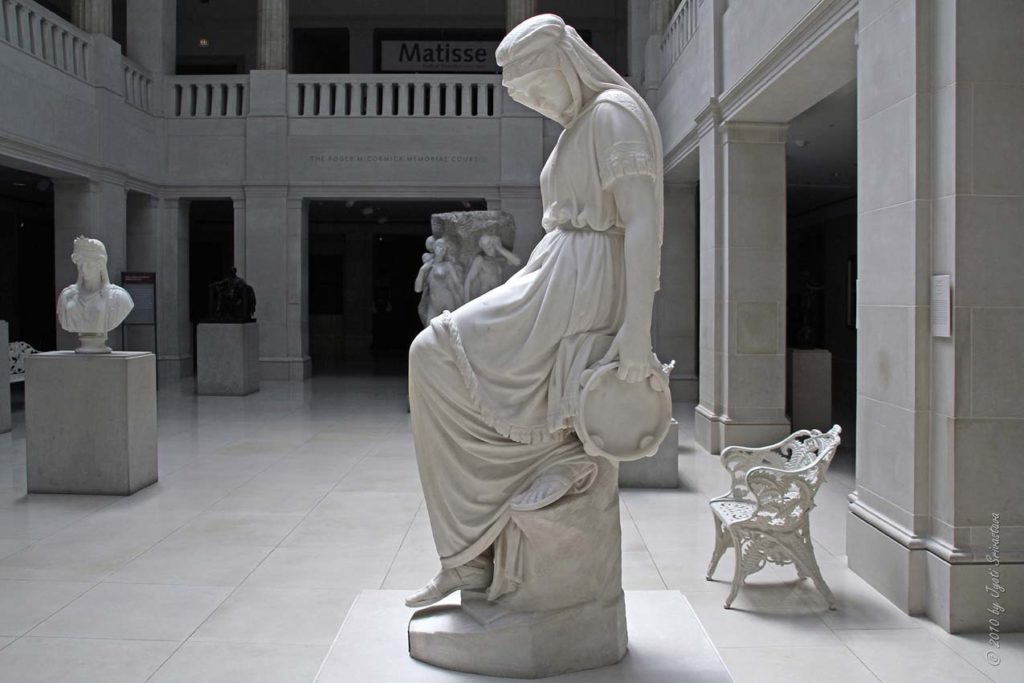
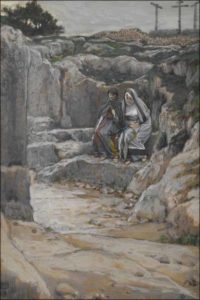
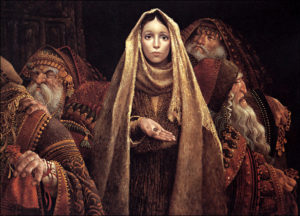
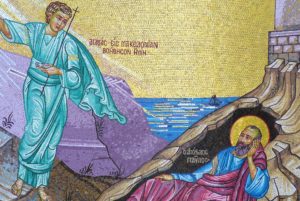
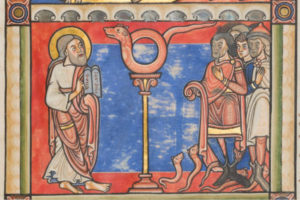 Where in the world did this reading from the Hebrew Scriptures come from? For the most part we can blame Jesus. In today’s Gospel reading he refers to this story when he says, “And just as Moses lifted up the serpent in the wilderness, so must the Son of Man be lifted up, that whoever believes in him may have eternal life.” At first it appears that the lectionary is proof-texting: they threw this story in this week because of what was said in the New Testament. Of course the assumption is that whoever is preaching is going to shy away from the crazy, whacked out Old Testament reading and go straight to the Gospel reading where Jesus is talking about God’s love. But we all know me better than that. I think there is more going on with this reading than just being chosen because of the allusion Jesus made in John’s gospel.
Where in the world did this reading from the Hebrew Scriptures come from? For the most part we can blame Jesus. In today’s Gospel reading he refers to this story when he says, “And just as Moses lifted up the serpent in the wilderness, so must the Son of Man be lifted up, that whoever believes in him may have eternal life.” At first it appears that the lectionary is proof-texting: they threw this story in this week because of what was said in the New Testament. Of course the assumption is that whoever is preaching is going to shy away from the crazy, whacked out Old Testament reading and go straight to the Gospel reading where Jesus is talking about God’s love. But we all know me better than that. I think there is more going on with this reading than just being chosen because of the allusion Jesus made in John’s gospel. Now a new king arose over Egypt, who did not know Joseph. A new king arose who did not know, who did not remember. And we know from the opening sentence that trouble is coming. The new king did not know Joseph had saved Egypt from starvation and was that Pharaoh’s right hand man. The new king did not remember the Hebrews were descended from Joseph and his family and had one time been welcomed in the land with open arms as their savior’s family. This new king did not know.
Now a new king arose over Egypt, who did not know Joseph. A new king arose who did not know, who did not remember. And we know from the opening sentence that trouble is coming. The new king did not know Joseph had saved Egypt from starvation and was that Pharaoh’s right hand man. The new king did not remember the Hebrews were descended from Joseph and his family and had one time been welcomed in the land with open arms as their savior’s family. This new king did not know.